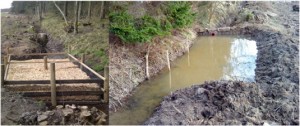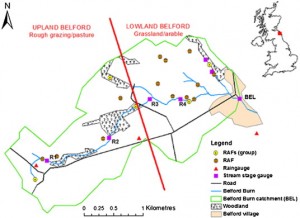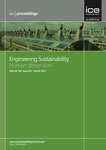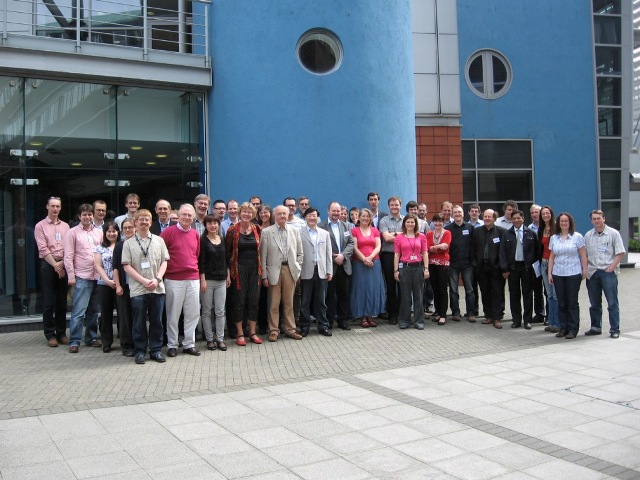 Back-to-nature flood schemes which use the land’s natural defences to slow river flow and reduce flooding could be a cost-effective way of tackling one of the biggest problems facing the UK today.
Back-to-nature flood schemes which use the land’s natural defences to slow river flow and reduce flooding could be a cost-effective way of tackling one of the biggest problems facing the UK today.
The schemes – which include capturing flow upstream to prevent floods downstream where they are likely to have a greater impact on infrastructure and homes – have been trialled as part of a five-year research project by experts from Newcastle University in partnership with the Environment Agency.
 Using Belford Burn in Northumberland as a demonstration, the team have shown that by changing and hindering the natural flow pathways within a small catchment system, it is possible to manage the amount of run-off from the land. This reduces the risk of flooding in low-lying areas and also cuts down on pollution by preventing phosphorous and nitrates from being washed off the land.
Using Belford Burn in Northumberland as a demonstration, the team have shown that by changing and hindering the natural flow pathways within a small catchment system, it is possible to manage the amount of run-off from the land. This reduces the risk of flooding in low-lying areas and also cuts down on pollution by preventing phosphorous and nitrates from being washed off the land.
Published this month in the academic journal Science of the Total Environment, the findings were presented last week at the House of Commons Office of Science and Technology to inform the Government’s Environment White Paper.
Research lead, Dr Mark Wilkinson, who carried out the work while at Newcastle University and is now based at the James Hutton Institute in Aberdeen, said: “Climate projections for the UK suggest that total rainfall during winter months will continue to rise and with it the risk of flooding.
“What we have shown at Belford is that by employing so-called ‘soft engineering solutions’ to restrict the progress of water through a catchment – disconnecting fast-flow pathways and adding storage – we have been able to reduce the risk of flooding in the lower areas and, most importantly, in the town.
“Belford is not unique and there are many other areas around the UK where these solutions could make a significant impact and potentially protect peoples’ homes from some of the more severe flooding we are seeing at the moment.”
Strategies for Natural Flood Management (NFM)
Natural Flood Management aims to reduce the downstream maximum water height of a flood – the peak – or delay the arrival of the flood peak downstream, increasing the time available to prepare.
This is done by restricting the progress of water through a catchment and relies on one, or a combination of four key mechanisms which work with the environment to provide a sustainable solution to the problem:
• Storing water such as ponds, ditches and field attenuation bunds
• Increasing soil infiltration through the creation of ‘infiltration zones’ to help water get into the soil at certain locations, for example tree belts.
• Slowing water by increasing resistance to its flow, for example planting in the floodplain or riverside woodland
• Redirecting the water by channelling it away from the main flow into temporary water storage areas or buffer zones to hold the water back until the flood peak drops or restoring river meanders. This increases the length of the river and decreases its slope, slowing down the flow
Costing around £200,000, the Belford scheme was installed after a study of the area suggested the cost of a full conventional flood defence scheme for the town would cost in the region of £2.5 m.
“The situation in Belford is typical of many rural towns around the UK that are at risk of flooding,” explains Dr Paul Quinn, based in the School of Civil Engineering and Geosciences at Newcastle University.
“It is a town with a long history of flooding but the floods tend to be short-lived – albeit severe – and only tend to affect a small number of properties. A feasibility study concluded that traditional flood defences were not suitable because of the high-cost, lack of space for flood walls and banks and the relatively small number of properties involved.”
Just five months after the feasibility report was published, the July 2007 storm hit the North of England and ten homes and businesses in Belford were flooded. It was after this event the Newcastle University demonstrator project was launched.
“One of the main reasons why the Belford scheme has been such a success is because we’ve had the support of the community and local landowners behind us,” explains Dr Quinn, who has since carried out a second Catchment Management Scheme at Netherton Burn, Northumberland.
“There is no single solution to flooding – no ‘silver bullet’ – but what the Belford scheme has shown us is what can be achieved with local support and a thorough understanding of the land and the local environment.”
Source information:“A framework for managing runoff and pollution in the rural landscape using a catchment systems engineering approach.” M Wilkinson, P Quinn, N Barber, J Jonczyk. Science of the Total Environment January 2014. Volumes 468–469, 15 January 2014, Pages 1245–1254
DOI: 10.1016/j.scitotenv.2013.07.055
http://www.sciencedirect.com/science/article/pii/S0048969713008231








